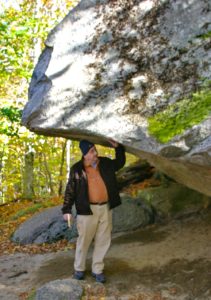 Larry Davis, long-time GSA member and professor emeritus at University of New Haven, shares how an early mentor and role model inspired him to become an OTF mentor to share his enthusiasm and excitement with new and future geologists.
Larry Davis, long-time GSA member and professor emeritus at University of New Haven, shares how an early mentor and role model inspired him to become an OTF mentor to share his enthusiasm and excitement with new and future geologists.
1. What attracted you to serve as a mentor for the On To the Future program?
As an undergraduate at Washington University in St. Louis in the late 1960s and early 1970s, I was fortunate to have Dorothy Echols as a mentor and role model. She encouraged me to attend my first GSA Annual Meeting (it was in Miami Beach), and she saw to it that I was introduced to all the “big” names of the time. I was amazed that they not only talked to me, but that most seemed interested in what I was doing, offered help and advice, and basically accepted me into the fellowship of geologists. I was appreciative of their help, but most of all I was fired up by their enthusiasm for the subject and their willingness to share it with me. Now that I am late in a career where I have had the opportunity to share my enthusiasm and excitement with my own students, I felt that it was time to expand my reach and share these things with other students, especially ones that were new to the field, to academia, to research, and to science. So many times during my career, I’ve been in some incredible place and had to pinch myself—someone was paying me to be there and look at all this cool stuff. It felt almost unfair. I want others to be able to share that feeling and to love what they do for a living as much as I do. On To the Future provided me with a perfect opportunity to meet new/future geologists and to share my experience with them by telling them my story and by listening to theirs.
2. How would you describe your experience?
I personally enjoyed it tremendously. It was fun to connect with the students, to hear about how they came to the field, to serve as a resource for them, to answer their questions, and much, much more. Their own enthusiasm was contagious and I really felt that I was honoring the memory of Dorothy Echols and all of my other mentors, by giving back and mentoring the next generation.
3. How has being an OTF mentor impacted your engagement with the geosciences?
It has made me think about what I learned from my own mentors and what impact it had on me. It helped me to crystallize my thinking about why I love what I do (which includes the teaching part, too). I retired from university teaching at the end of August 2018, but I am now working with younger kids to fire their enthusiasm for the field. Working with OTF helped me realize what mentoring really was, and I hope to continue not only as a mentor for that program, but also as a mentor for budding rock-hounds, cavers, or kids wondering why the pebbles in their driveways are so varied. This is especially important in retirement as it both keeps me young and keeps me connected to the field.
4. How has it deepened your experience of GSA as a community?
In some ways, I think my answers to the previous questions also address this one. I feel that as I was brought into the community by my mentors so long ago, I am now helping to bring a new, diverse group of future practitioners into the field. We need new blood and we especially need diversity. Not because it is “politically correct,” but because we need new ideas. Who knows what part of a person’s background and life experience leads to these new ideas? The more diverse the participants, the more diverse the ideas we’ll get.
5. What would you say to someone considering supporting OTF, either as a mentor or a donor?
This is the future of our science—support it! I cannot stress enough the importance of diversity (see my answer to question 4) and how OTF is supporting diversity. I urge you to share your experience with these eager students and early career professionals, answer their questions, and introduce them to people in your network. If you don’t feel comfortable talking with the mentees, then at least support the program financially, although doing both would be best.
